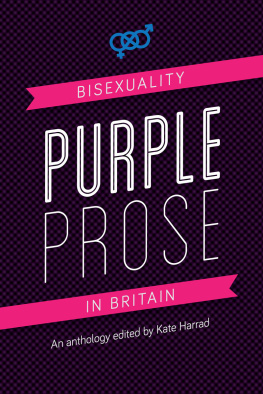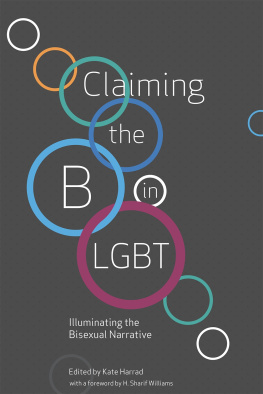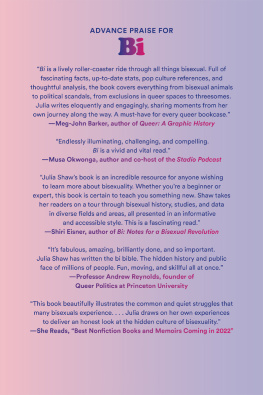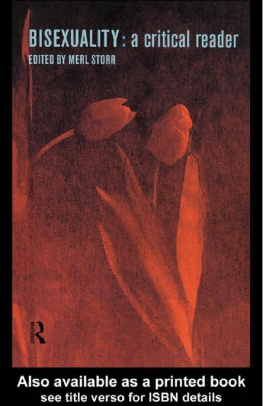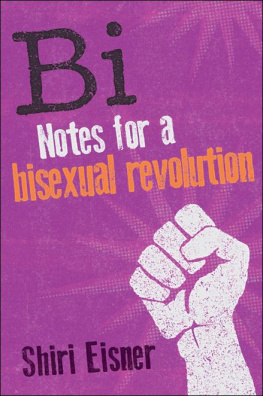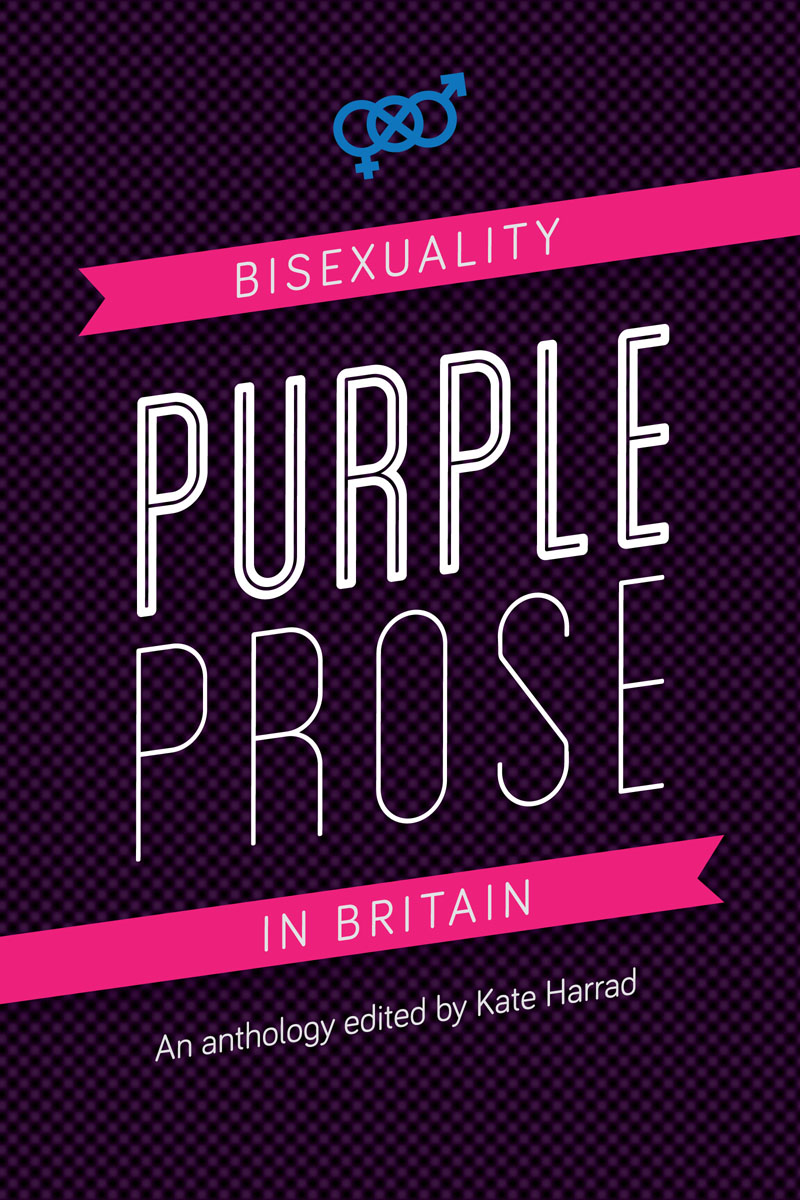

PURPLE PROSE
BISEXUALITY IN BRITAIN
TEXT COPYRIGHT 2016 BY KATE HARRAD
IMAGE COPYRIGHTS 2016 BY THE INDIVIDUAL CONTRIBUTORS, AS LISTED ALL RIGHTS RESERVED . NO PART OF THIS BOOK MAY BE USED OR REPRODUCED IN ANY MANNER WHATSOEVER WITHOUT WRITTEN PERMISSION FROM THE PUBLISHER EXCEPT IN THE CASE OF BRIEF QUOTATIONS IN CRITICAL ARTICLES AND REVIEWS.
THORNTREE PRESS, LLC
PO BOX 301231
PORTLAND, OR 97294
COVER AND INTERIOR DESIGN BY JEFF WERNER
COPY-EDITING BY ROMA ILNYCKYJ
PROOFREADING BY AMY HAAGSMA
LIBRARY OF CONGRESS CATALOGING-IN-PUBLICATION DATA
Names: Harrad, Kate, editor.
Title: Purple prose: bisexuality in Britain / edited by Kate Harrad.
Description: Portland, OR : Thorntree Press, 2016. | Includes bibliographical references.
Identifiers: LCCN 2016011558 (print) | LCCN 2016018344 (ebook) | ISBN 9780996460163 (paperback) | ISBN 9780996460170 (Epub) | ISBN 9781944934033 (Kindle)
Subjects: LCSH : Bisexuality--Great Britain. | Bisexuals--Great Britain. | BISAC : SOCIAL SCIENCE / Gay Studies. | SOCIAL SCIENCE / Lesbian Studies.
Classification: LCC HQ74.2.G7P87 2016 (print) | LCC HQ74.2.G7 (ebook) | DDC 306.76/50941--dc23
LC record available at https://lccn.loc.gov/2016011558
10 9 8 7 6 5 4 3 2 1
Printed in the United States of America
EDITOR: KATE HARRAD
Individual chapter editors:
Jacq Applebee
Meg-John Barker
Elizabeth Baxter-Williams
Jamie Q Collins
Grant Denkinson
Kate Harrad
Symon Hill
Juliet Kemp
Fred Langridge
Marcus Morgan
Kaye McLelland
Milena Popova

Contents
INTRODUCTION
Hi.
This book is here to tell you something we hope you already knowthat bisexuality is real and valid. And to talk about what that means: how its defined, whos included, how to deal with people who dont understand, and where to find support and a community if you want it.
Maybe you already identify as bisexual. Maybe youre wondering about it. Maybe youre bi-curious, or just generally curious. Maybe you have a friend or partner or family member whos bisexual. Whatever your reason, we hope this book will be useful. Its designed so that you can dip in and out of it, picking which topics are relevant to you.
Purple Prose is edited by multiple people. Im the overall editor, and Ive written some of the chapters, but others were produced by individual chapter editors, whose bios you can find at the back. Some of them are bi activists, some are academics, some are writers, some are all three. They wrote their chapter and interviewed people for quotes; youll see a lot of quotes used throughout, and mostly these are from people who were interviewed specifically for this book, via social media or email or face-to-face discussions.
Weve also used (with permission) excerpts from websites, books, newspapers and conversations on social media. The aim is to get a reasonable variety of voices representedalthough its still true that many of the voices are from a specific UK bi community and mostly represent those views. However, we have tried to keep the different voices and styles of writing, which is why different chapters may read differently. In a way, its an anthology of bi writing, although its also a coherent book you can read from beginning to end.
Why is it called Purple Prose? Because purple has become the colour associated with bisexuality, as pink is associated with the gay community. The bi flag is pink, purple and blue.
Why have we written a book about British bisexuality in particular? Because although there are several excellent books out there about bisexuality, they are US-based, or over twenty years old, or aimed at a mostly academic audience. We felt there was room for a contemporary, accessible book from a British perspective, and we hope this is it. However, this book should also be useful for anyone from any country who wants to know about bisexuality and the many issues associated with it.
We hope you enjoy it.
One final note about our use of language. Sexual politics, and identity politics in general, is a fraught area in terms of language, and we have tried to be as careful as possible when choosing which terms and acronyms to use; for example, we use LGB in some contexts, LGBT in others and LGBTQIA+ as our default term for the community were describing. The glossary at the end should help if you come across any unfamiliar terms.
1
THE BASICS
Editor: Kate Harrad
Part One: Definitions and Numbers
For me, it is that I am missing a little bit of wiring that allows other people to discriminate between the genders when it comes to attraction. Not that I consider it a deficitit is a little like the unusual brain symmetry that allows someone to be ambidextrous.
DH Kelly
Are labels really necessary?
People often say things like labels are for jars and were all just human, so why divide people up by race/gender/sexuality?
Its a reasonable question. The answer is that language matters, and it matters just as much here as it does anywhere else. Apples, strawberries and grapes are all fruit, but nobody says all fruit is fruit, so why distinguish? Gender and sexuality labels give us potentially useful information about someone, just as its often useful to know whether someone is tall or short, or vegetarian, or terrified of snakes. The important thing is that the label is accurate and descriptive, and not imposed by someone else.
So thats why we think it matters that some people are bisexual and are able to call themselves bisexual.
I could finally describe what I felt. And whats more, I could describe it using existing words, which made it easier for others to understand what I meant.
Mharie
Definitions
If you asked random people in the street for a one-sentence definition of bisexuality, youd probably get two things: a weird look, and a sentence such as someone whos attracted to both men and women or someone who has sex with both genders. This is also what you get if you search online for a definition, and from most dictionaries.
If you ask someone in the UK bisexual community how they define bisexuality, theres a good chance youll get something slightly different from the above. This is because the current dictionary definitions arent the ones used by a lot of bisexual people.
Why not?
Well, several reasons:
- They focus on sex and sexual attractionbut bisexuality isnt just about who youre sleeping with.
- They make people assume that to be bisexual, you have to be equally attracted to men and women. Not true!
- Theyre based on the idea that bisexuality is a half-and-half sexuality: youre half gay half straight. Lots of problems with this one. For one thing, bisexuality is a sexuality in itself, not something you can divide up. For another, much of the LGBTQIA+ (lesbian, gay, bisexual, transgender, queer, intersexual, asexual, plus) community doesnt view gender as binary.
All of these issues will come up later in the book. Lets quickly address one thing, though: sex. Or rather, the potential absence of sex.
Next page
